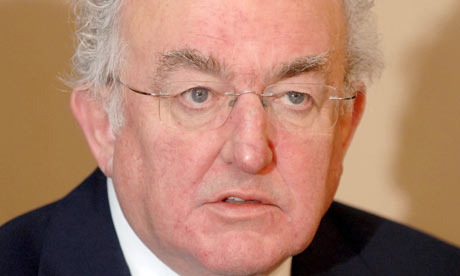By David Pierson
LA Times
Excerpts - October 22, 2009
The state-owned China National Offshore Oil Corp., or CNOOC, reportedly is negotiating the purchase of leases owned by the Norwegian StatoilHydro in U.S. waters in the Gulf of Mexico, the source of about a quarter of U.S. crude oil production.
China's push to enter U.S. turf comes four years after CNOOC's $18.5-billion bid to buy Unocal Corp. was scuttled by Congress on national security grounds. The El Segundo oil firm eventually merged with Chevron Corp. of San Ramon.
Whether CNOOC's second attempt to lock up U.S. petroleum assets will trigger a similar political backlash remains to be seen. The sour U.S. economy and the need for Washington and Beijing to cooperate on potentially larger issues could mute any outcry.
The U.S. could also find it difficult to rebuff China when it has long welcomed other foreign investment in the gulf. In addition to StatoilHydro, foreign oil companies with stakes in deep-water projects there include Spain's Repsol, France's Total, Brazil's Petrobras, British oil giant BP and the Dutch-British multinational Shell.
The U.S. risks undercutting its foreign policy goals as well. Concern is growing over China's aggressive investment in oil-rich nations with anti-U.S. [anti-Zionist] regimes, including Iran and Sudan. Denying China a shot at drilling in U.S. waters would only encourage Beijing to make deals in volatile regions given that new oil reserves in stable, democratic nations are getting harder to find. [...]
Beijing has urged the four major state-run oil corporations -- China National Petroleum Corp., Sinopec, CNOOC and Sinochem -- to acquire more international assets. [...]
At $14.9 billion so far this year, the value of Chinese oil and gas mergers and acquisitions in 2009 is already double last year's figure, according to research firm Dealogic.
The largest this year was Sinopec's $8.9-billion purchase of the Swiss oil exploration company Addax Petroleum Corp. The deal, which was announced in June, gave the Chinese access to potentially vast oil deposits off the coast of West Africa and in northern Iraq.
China has also extended huge sums of credit, including a $25-billion loan to Russian companies Rosneft and Transneft, to pay off debt and develop the East Siberia Pacific Ocean pipeline in exchange for 300,000 barrels a day of oil.
The Chinese Development Bank lent Brazil's Petrobras $10 billion to help with its $170-billion, five-year plan to increase its crude output. In exchange, Petrobras agreed to give the Chinese 200,000 barrels a day of oil exports.
China extended a $4-billion loan to Venezuela to expand various oil projects, according to the Energy Information Administration. Chinese companies are also reportedly eyeing new oil deals in Nigeria and Ghana.
The positive effect of all that investment, some analysts said, is that Beijing is helping expand the world's oil supply at a time when many major oil companies have scaled back.
"The [global economic] crisis has put a stop in foreign company expansion plans, freezing mergers and acquisitions because profits are deteriorating," said Lilian Luca, chief operating officer of advisory group Beijing Axis. "China remains one of the few sources of capital."
But much of that capital is being funneled to governments with poor human rights records and links to terrorism [support for anti-Zionist resistance].
China's importing of crude oil from war-torn Sudan increased 13.8% in August from a year earlier, according to Chinese state media.
Imports from Iran jumped 14.7% in the same period. Over the last five years, China has signed an estimated $120 billion in oil deals with Tehran -- money some worry will undermine efforts by the U.S. and its allies to tighten economic sanctions against Iran to pressure it to abandon its nuclear ambitions.
China has defended its most controversial oil deals, contending that its investments will eventually spur stability in troubled states.
China's shopping spree has been aided by the nation's foreign reserves, which recently reached a record $2.3 trillion -- about two-thirds of which is estimated to be in U.S. dollars. Buying natural resources such as oil is a way for China to diversify holdings that have been heavily concentrated in U.S. securities.
Despite the recent activity, analysts say, China's oil production overseas will take years of development before it can match long-established companies such as Exxon Mobil Corp. and BP, which are huge players in the gulf.
Full article








